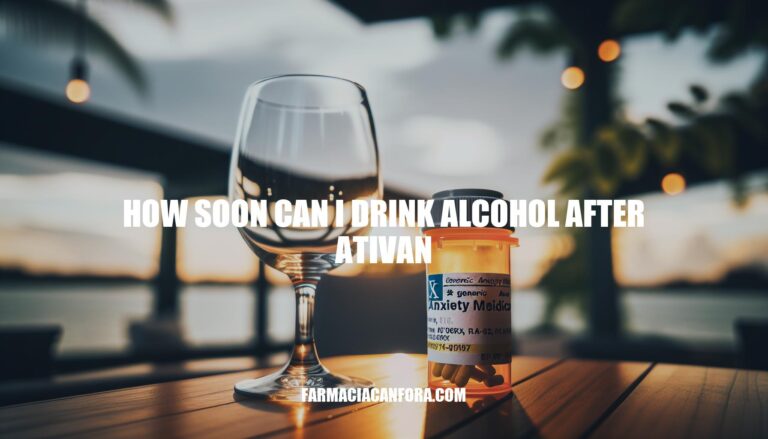


Understanding how soon you can drink alcohol after taking Ativan (lorazepam) is crucial due to the significant health risks involved. Both Ativan and alcohol are central nervous system depressants, and combining them can lead to severe side effects such as slowed breathing, impaired motor functions, and even life-threatening consequences. It’s essential to wait until Ativan is fully cleared from your system, which can take several days, to avoid these dangerous interactions. Prioritizing this knowledge helps ensure your safety and well-being.
Ativan (generic name: lorazepam) is a medication belonging to the benzodiazepine class. It is primarily used to treat anxiety disorders, insomnia caused by anxiety, and to manage agitation from alcohol withdrawal.
How it works: Ativan enhances the effects of GABA (gamma-aminobutyric acid), a neurotransmitter that inhibits activity in the brain, leading to a calming effect.
Interaction with alcohol: Combining Ativan with alcohol is dangerous. Both substances increase GABA activity, which can lead to excessive sedation, dizziness, slowed breathing, and even overdose. It’s best to avoid alcohol entirely while taking Ativan.
Ativan (lorazepam) has a half-life of about 12 hours. This means it takes 12 hours for the concentration of the drug in the body to reduce by half. Typically, Ativan can stay in your system for up to 5 days, but its metabolites might linger longer.
Understanding the half-life and duration of Ativan in the system is crucial for determining when it’s safe to drink alcohol. Since both Ativan and alcohol depress the central nervous system, combining them can lead to severe side effects like respiratory depression, impaired motor function, and increased sedation. It’s generally recommended to wait until Ativan is fully cleared from your system before consuming alcohol to avoid these risks.
Mixing Ativan (lorazepam) with alcohol can be extremely dangerous. Here are the specific risks and dangers:
Respiratory Depression: Both Ativan and alcohol are central nervous system depressants. Combining them can significantly slow down breathing, potentially leading to respiratory failure.
Sedation and Drowsiness: The sedative effects of both substances can be amplified, causing extreme drowsiness, dizziness, and impaired coordination.
Cognitive Impairment: This combination can lead to confusion, memory problems, and poor concentration.
Overdose Risk: The risk of overdose increases, which can be fatal. Symptoms include severe drowsiness, confusion, and loss of consciousness.
Cardiovascular Issues: There can be a significant drop in blood pressure and heart rate, which can be life-threatening.
Increased Risk of Accidents: Impaired judgment and motor skills can lead to accidents and injuries.
Long-term Health Consequences: Chronic use of both substances together can lead to liver damage, substance use disorders, and increased risk of self-harm.
It’s crucial to avoid alcohol while taking Ativan to prevent these severe health risks. If you have any concerns, it’s best to consult with a healthcare professional.
Guideline for Drinking Alcohol After Taking Ativan:
Expert Recommendations:
Stay safe and always consult with your healthcare provider for advice tailored to your specific situation.
The article emphasizes the dangers of combining Ativan (lorazepam) with alcohol due to their shared central nervous system depressant properties.
Key points include:
It’s crucial to consult with a healthcare professional for personalized advice and to prioritize safety by waiting the recommended period before consuming alcohol after taking Ativan.